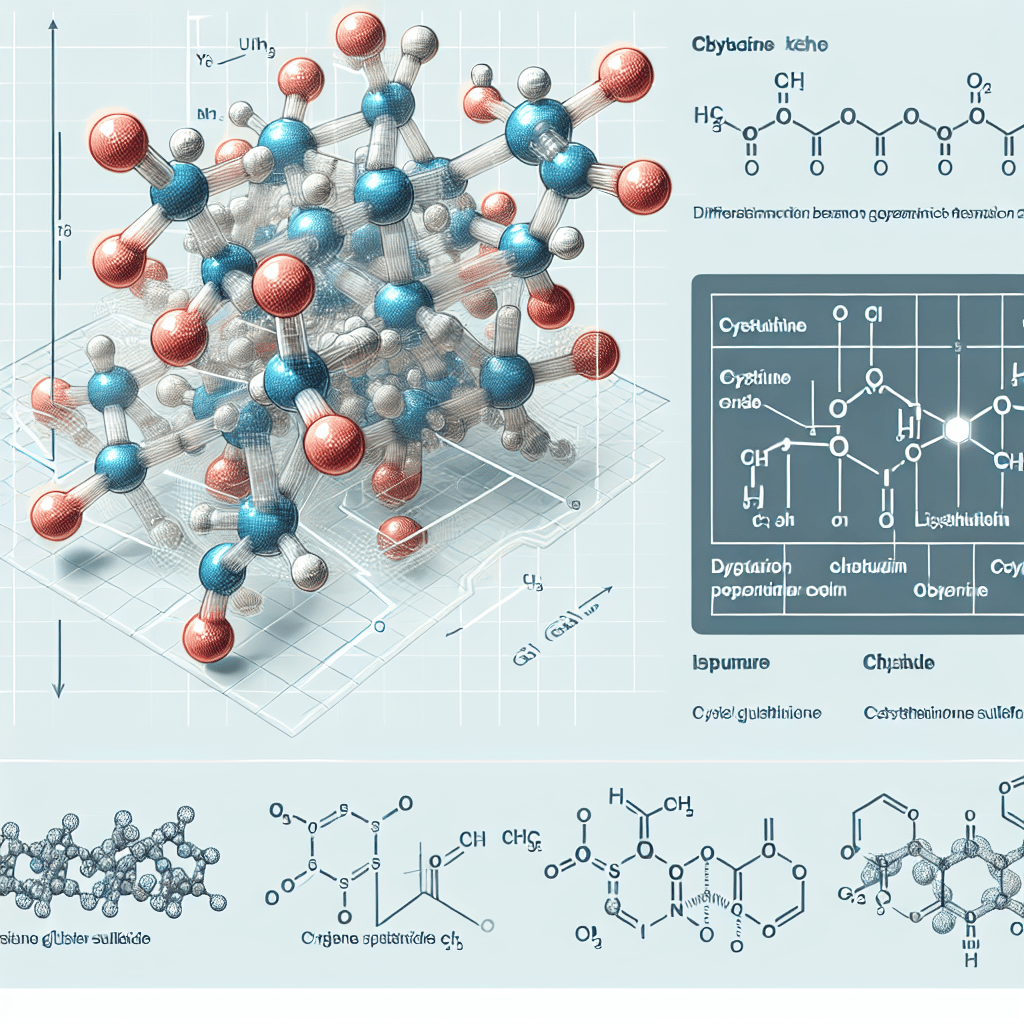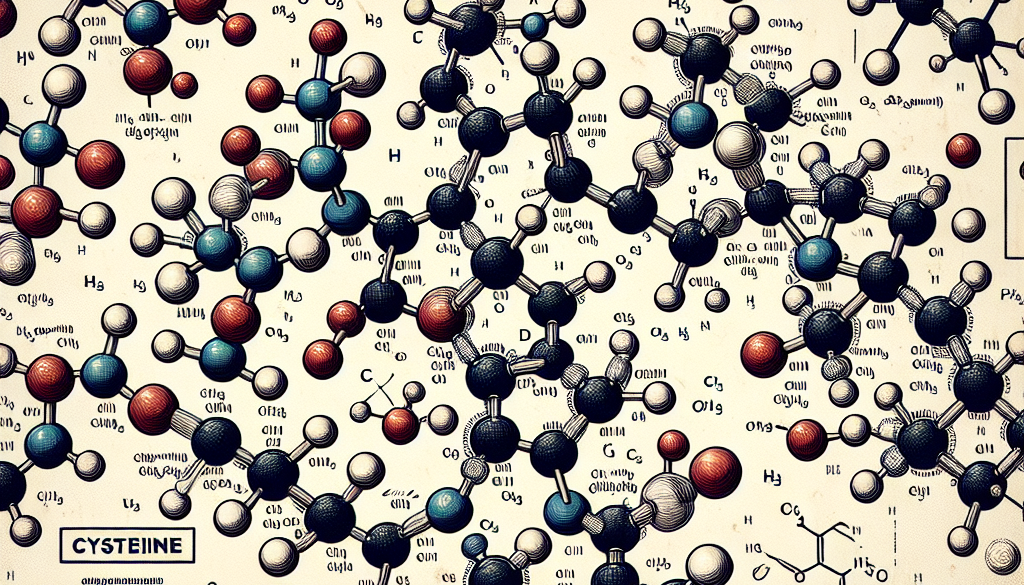Cysteine Glutathione Disulfide: What to Know
-
Table of Contents
- Cysteine Glutathione Disulfide: Essential Knowledge for Health and Wellness
- Understanding Cysteine Glutathione Disulfide
- The Role of GSSG in the Body
- Health Benefits of Glutathione and GSSG
- Factors Affecting Glutathione Levels
- Supporting Glutathione Levels Through Diet and Supplementation
- Dietary Sources of Glutathione and Precursors
- Glutathione-Enhancing Supplements
- Research and Case Studies on Glutathione
- Conclusion: The Significance of Cysteine Glutathione Disulfide
- Enhance Your Health with ETprotein’s Protein Products
Cysteine Glutathione Disulfide: Essential Knowledge for Health and Wellness

Glutathione, often referred to as the “master antioxidant,” is a critical molecule in maintaining oxidative balance and overall health. Cysteine glutathione disulfide, also known as glutathione disulfide (GSSG), plays a pivotal role in the glutathione redox cycle. Understanding the function, importance, and ways to support healthy levels of this compound can have profound implications for health and disease prevention.
Understanding Cysteine Glutathione Disulfide
Glutathione is a tripeptide composed of three amino acids: cysteine, glutamate, and glycine. It exists in two forms within the body: the reduced form (GSH) and the oxidized form (GSSG). The ratio of GSH to GSSG within cells is often used as a measure of cellular oxidative stress.
The Role of GSSG in the Body
Cysteine glutathione disulfide forms when two glutathione molecules become linked via a disulfide bond during the process of neutralizing free radicals. This reaction is catalyzed by the enzyme glutathione peroxidase. The resulting GSSG can then be converted back into its reduced form by the enzyme glutathione reductase, using NADPH as a reducing agent. This cycle is essential for detoxifying harmful compounds and preventing cellular damage.
Health Benefits of Glutathione and GSSG
Glutathione and its related compounds are involved in numerous physiological processes. Here are some of the key health benefits:
- Antioxidant Protection: Glutathione protects cells from damage caused by reactive oxygen species (ROS) and free radicals.
- Detoxification: It plays a crucial role in detoxifying harmful substances, including environmental toxins and carcinogens.
- Immune Function: Adequate levels of glutathione are necessary for the proper functioning of immune cells.
- Anti-Aging: By combating oxidative stress, glutathione can slow down the aging process and reduce the risk of age-related diseases.
- Neuroprotection: Glutathione has been shown to have neuroprotective properties, potentially benefiting conditions like Parkinson’s and Alzheimer’s disease.
Factors Affecting Glutathione Levels
Several factors can influence the levels of glutathione and GSSG in the body:
- Diet: Consuming foods rich in sulfur-containing amino acids, such as cysteine, can help boost glutathione synthesis.
- Exercise: Regular physical activity has been shown to increase glutathione levels, although excessive or intense exercise can temporarily deplete them.
- Age: Glutathione levels naturally decline with age, making supplementation or dietary adjustments more important in older adults.
- Stress and Illness: Chronic stress and illness can deplete glutathione reserves, increasing the need for dietary support.
Supporting Glutathione Levels Through Diet and Supplementation
Maintaining optimal levels of glutathione and GSSG is crucial for health. Here are some strategies to support these levels:
Dietary Sources of Glutathione and Precursors
While glutathione is found in some foods, it is not well absorbed from the diet. Instead, focusing on foods that provide its precursors, particularly cysteine, can be more effective. These include:
- Whey protein
- Allium vegetables (garlic, onions, leeks)
- Cruciferous vegetables (broccoli, Brussels sprouts, kale)
- Nuts and seeds
- Lean meats and fish
Glutathione-Enhancing Supplements
Several supplements can help increase glutathione levels:
- N-acetylcysteine (NAC): A precursor to cysteine that can boost glutathione synthesis.
- Alpha-lipoic acid: An antioxidant that can regenerate glutathione.
- S-adenosylmethionine (SAMe): Involved in methylation processes that can enhance glutathione production.
- Vitamins C and E: Antioxidants that work synergistically with glutathione.
Research and Case Studies on Glutathione
Scientific research has highlighted the importance of glutathione in various health conditions. For instance, studies have shown that patients with chronic diseases such as HIV/AIDS, cancer, and liver disease often have depleted levels of glutathione. Supplementation with NAC has been found to improve glutathione levels and patient outcomes in some of these cases.
In the realm of sports science, research indicates that athletes undergoing intense training may benefit from glutathione supplementation to prevent oxidative stress and improve recovery.
Conclusion: The Significance of Cysteine Glutathione Disulfide
In summary, cysteine glutathione disulfide is a vital component of the body’s antioxidant defense system. Maintaining a healthy balance between GSH and GSSG is essential for protecting against oxidative stress, supporting detoxification, and promoting overall health. Through a combination of diet, lifestyle, and supplementation, individuals can support their glutathione levels and reap the associated health benefits.
Enhance Your Health with ETprotein’s Protein Products
If you’re looking to support your glutathione levels through diet, consider incorporating high-quality protein products from ETprotein. Their range of organic, non-GMO, allergen-free proteins provides an excellent source of amino acids, including cysteine, which is crucial for glutathione synthesis.
ETprotein’s offerings cater to various industries and dietary preferences, ensuring that you can find the right product to meet your health and wellness goals. By choosing ETprotein, you’re not only investing in your health but also supporting a company with a strong commitment to quality and sustainability.
About ETprotein:
ETprotein, a reputable protein and L-(+)-Ergothioneine (EGT) Chinese factory manufacturer and supplier, is renowned for producing, stocking, exporting, and delivering the highest quality organic bulk vegan proteins and L-(+)-Ergothioneine. They include Organic rice protein, clear rice protein, pea protein, clear pea protein, watermelon seed protein, pumpkin seed protein, sunflower seed protein, mung bean protein, peanut protein, and L-(+)-Ergothioneine EGT Pharmaceutical grade, L-(+)-Ergothioneine EGT food grade, L-(+)-Ergothioneine EGT cosmetic grade, L-(+)-Ergothioneine EGT reference grade and L-(+)-Ergothioneine EGT standard. Their offerings, characterized by a neutral taste, non-GMO, allergen-free attributes, with L-(+)-Ergothioneine purity over 98%, 99%, cater to a diverse range of industries. They serve nutraceutical, pharmaceutical, cosmeceutical, veterinary, as well as food and beverage finished product distributors, traders, and manufacturers across Europe, USA, Canada, Australia, Thailand, Japan, Korea, Brazil, and Chile, among others.
ETprotein specialization includes exporting and delivering tailor-made protein powder and finished nutritional supplements. Their extensive product range covers sectors like Food and Beverage, Sports Nutrition, Weight Management, Dietary Supplements, Health and Wellness Products, and Infant Formula, ensuring comprehensive solutions to meet all your protein needs.
As a trusted company by leading global food and beverage brands and Fortune 500 companies, ETprotein reinforces China’s reputation in the global arena. For more information or to sample their products, please contact them and email sales(at)ETprotein.com today.














